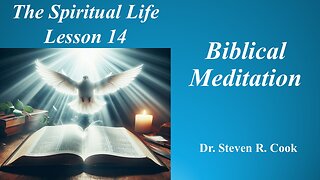Premium Only Content

Do Christians Have a Sinful Nature?
In Romans, Paul discusses the concept of believers being “dead to sin” (Rom 6:11) in the context of our spiritual union with Christ. The main idea of Roman 6:1-14 is that through faith in Jesus Christ, we are spiritually united with Him in His death and resurrection and separated from the power of sin. For Christians, there is a double identification with Christ in His death and resurrection. First, “we have become united with Him in the likeness of His death” (Rom 6:5), as “our old self was crucified with Him” (Rom 6:6), and “we have died with Christ” (Rom 6:8). Second, Paul says we have been raised with Christ “so we might walk in newness of life” (Rom 6:4), having been “freed from sin” (Rom 6:7). The culmination of these truths leads to Paul’s exhortation, “Even so, consider yourselves to be dead to sin, but alive to God in Christ Jesus” (Rom 6:11).
When Paul speaks of being “dead to sin,” he means that believers, through our union with Christ, have been freed from the power and dominion of sin in our lives. Paul emphasizes that the old self, characterized by slavery to sin, has been crucified with Christ. As a result, believers are no longer under the dominion of sin but are now alive to God in Christ. Being “dead to sin” doesn’t mean believers are without a sinful nature. On the contrary, we continue to possess a sin nature (Rom 13:14; Gal 5:17, 19; Eph 4:22; Col 3:9; 1 John 1:8), and commit acts of personal sin throughout our lives (Eccl 7:20; Rom 7:14-25; 1 John 1:10), “For we all stumble in many ways” (Jam 3:2). Instead, being “dead to sin” signifies a change in our relationship to the sin nature and it’s power over us. This is why Paul states, “Therefore do not let sin reign in your mortal body so that you obey its lusts, and do not go on presenting the members of your body to sin as instruments of unrighteousness” (Rom 6:12-13a). The sin nature continues to reside in our bodies after our salvation in Christ, and it is possible for us to yield to its influence and to let it reign over us. Sadly, it is possible for Christians to commit any sin unbelievers commit (i.e., lying, murder, gossip, adultery, idolatry, etc.), and to fall into a pattern of sin that can destroy their lives (i.e., alcoholism, drugs, etc.) This is not what God wants for us. He wants us to live righteous and holy lives based on the truth of His Word (2 Tim 3:16-17; 1 Pet 1:15-16), lives that glorify Him and edify others, manifesting humility, love, selflessness, and sacrifice. God calls us to live new lives, empowered by the Holy Spirit (Eph 5:18), for if we “walk by the Spirit” we “will not carry out the desire of the flesh” (Gal 5:16). God’s directive is “to present yourselves to God as those alive from the dead, and your members as instruments of righteousness to God” (Rom 6:13b). That’s how we should walk.
In summary, being “dead to sin” in the context of the New Testament, especially in Paul’s writings, refers to the idea that through faith in Christ, believers have undergone a spiritual transformation. We are no longer enslaved by the power of sin, having been united with Christ in His death and resurrection, and are now called to live in righteousness and obedience to God.
-
 11:39
11:39
Thinking on Scripture
4 months agoSpiritual Life, Lesson 14 - Biblical Meditation
221 -
 LIVE
LIVE
GritsGG
2 hours agoWe Are Winning Every Game! Win Streaking! 👑 2998+ Ws
275 watching -
 35:42
35:42
Randi Hipper
1 hour agoBITCOIN ALL TIME HIGHS INCOMING! LEVELS TO WATCH
2.36K3 -
 14:18
14:18
Michael Button
1 day agoThis New Discovery in the Amazon is Rewriting History
315 -
 1:55:26
1:55:26
Welcome to the Rebellion Podcast
13 hours ago $7.48 earnedHappy July 4th - WTTR Podcast Live 7/4
18K4 -
 10:59
10:59
The Car Guy Online
2 days agoFormer GM Engineer EXPOSES Planned Obsolescence Tactics.
33.5K18 -
 LIVE
LIVE
FyrBorne
15 hours ago🔴Warzone M&K Sniping: Salute To The Ones Who Made It Possible
75 watching -
 LIVE
LIVE
tylerpasta
4 hours agoWARZONE WRECKAGE: Pasta King Drops Hot!
30 watching -
 2:46
2:46
Gun Drummer
19 hours agoHappy Independence Day!
26.8K32 -
 22:41
22:41
Ohio State Football and Recruiting at Buckeye Huddle
1 day agoOhio State Football: 7 Things to Know about the 2025 Buckeyes
21.8K3